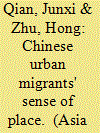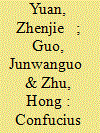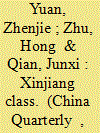|
|
|
Sort Order |
|
|
|
Items / Page
|
|
|
|
|
|
|
| Srl | Item |
| 1 |
ID:
132408


|
|
|
|
|
| Publication |
2014.
|
| Summary/Abstract |
In this paper, we study urban migrants' sense of place in Guangzhou, China, focusing on the structural relations between place attachment, identification and dependence as the three key place dimensions. Through both quantitative structural equation modelling and qualitative analysis of in-depth interviews data, our research suggests that migrants' sense of place demonstrates complex relationships between the three registers of emotional attachment, identity formation and functional dependence. The construction of sense of place is also related to the personal experiences of living as urban 'outsiders'. Our research also reveals a striking difference between the city and community levels in terms of the ways in which migrants' sense of place is constructed. Urban migrants tend to exploit the functional utilities of microscopic urban spaces to meet their demands for recreation, education and socialisation. On the other hand, their sense of place to the city is largely compromised by their attachment to the hometown and conditioned by their personal identification to the city.
|
|
|
|
|
|
|
|
|
|
|
|
|
|
|
|
| 2 |
ID:
148502


|
|
|
|
|
| Summary/Abstract |
The majority of Anglophone literature tends to portray Confucius Institutes as playing a successful role serving China’s interests in its foreign collaborations. So far, the threat of this institution has been largely stereotyped and even taken for granted. Few scholars question the influence and capacity of the institution on both global and local scales. Relying on cartograms, correlation and national image analyses as well as qualitative studies, this article examines the influence of Confucius Institutes as the institution globalized and localized. This article reports three main findings: (1) the geopolitical influence of Confucius Institutes is uneven in different regions and they are engaged in an ongoing process of geopolitical construction; (2) analyses of correlation with China’s national image show that not only does the influence of the institution vary in regions but also that the project could have a negative impact on bilateral cooperation, suggesting that, contrary to popular thinking, Confucius Institutes have not had a positive impact on China’s global interests; and (3) the capacity of the institutes in everyday operations is systematically limited, reflecting China’s inexperience in managing this global cultural network. Confucius Institutes are generous in making economic concessions but are hesitant during political negotiations, which can be said to mirror China’s patchy performance in economic and political reform.
|
|
|
|
|
|
|
|
|
|
|
|
|
|
|
|
| 3 |
ID:
140892


|
|
|
|
|
| Summary/Abstract |
Based on the notions of ‘popular geopolitics’ and ‘practical geopolitics’, this article explores how China’s geopolitical strategies are represented and reproduced by the popular songs in the CCTV (China Central Television) Spring Festival Gala during the past thirty years (1983–2013). Drawing on the (con)textual and visual analysis of 539 popular songs, how geopolitical knowledges are represented and reproduced by these songs and how these songs are involved with China’s geopolitical strategies are analysed. The main argument of this article indicates that the official regulated popular songs in the annual Gala can be considered as important constitutions of China’s state apparatus which aim at propagandising and legitimating the official geopolitical strategies on both internal and international affairs. As research of the geopolitical engagements of China’s popular music, this article might also be read as a contribution to wider literatures on popular and practical geopolitics from a non-Western perspective.
|
|
|
|
|
|
|
|
|
|
|
|
|
|
|
|
| 4 |
ID:
156611


|
|
|
|
|
| Summary/Abstract |
The Xinjiang Class (Xinjiang neidi ban, or Xinjiangban) has far-reaching implications for Beijing's governance of ethnic minorities in Xinjiang. Existing literature has focused primarily on the Uyghur–Han dichotomy, with limited attention being paid to the actual multi-ethnic interactions that constitute the situated dynamics of policy implementation. Utilizing the notions of the space of prescription and the space of negotiation to develop an analytical framework, this paper argues that social relations in the Xinjiangban are ongoing constructions borne by everyday experiences of domination and negotiation, and that space is constitutive of this situated dynamic. Based on nearly four years of research at a Xinjiangban, we make a case for the fluidity and incoherence of the implementation of the Xinjiangban policy. Those who implement it at the school level produce a space of prescription that deploys specific spatial–temporal arrangements to manage expressions of ethnic identity. Driven by the need to achieve upward mobility, minority students are open-minded about the Han- and patriotism-centred education. However, they use innovative and improvised tactics to create spaces of negotiation to re-assert their ethnicities. In the Xinjiangban, minority students do comply with spaces of prescription, but they simultaneously keep their ethnic and religious practices alive.
|
|
|
|
|
|
|
|
|
|
|
|
|
|
|
|
|
|
|
|
|